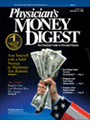Publication
Article
Physician's Money Digest
PRN: Financial Flea Market
Author(s):
Antiques Roadshow
You wouldn't believe what accumulatesin my idea file for columns. Ihave a satchel overflowing with facts,factoids, opinions, and clippings—bothedited and raw. Some end up ascolumns, some go to the circular file, andothers go to this column's equivalent ofthe movie industry's direct-to-videoreleases: the for-what-it's-worth financialflea market. Who knows, just as onPBS', you might findit's the bargain trifle that makes you rich.To wit, consider these maxims:
•Success is in the basics. For instance,always negotiate the best terms fromvendors, suppliers, and landlords ratherthan take the first offer—always.
•Hire very, very carefully, but whennecessary, fire quickly (document it, ofcourse). Hire for good attitude; skillscan be taught. Fire for bad attitude; it'san organizational cancer.
•With all new ventures, there isthe potential for hidden risks (ie, thedreaded law of unintended consequences).Before you start somethingnew, think it carefully through twice,and then think it through again.
•Be careful of rules of thumb. Theyalways rely on the past, not the futureyou're trying to create.
•The first mutual fund was foundedin 1924 to allow small investor poolsto afford professional money management.In the past 80 years, they havegrown to outnumber the stocks theypurport to manage, and in doing so,have become battlegrounds of conflictinginterests. Be careful.
•Stock options that are not expensedequate to a legal method forexecutives to give themselves up to50% of their boss/owners'futureappreciation by diluting the existingshare base, and doing so without effectiveaccountability.
•What gets monitored gets done. Ajob without a designated timeline isn'ta job or work.
•There is no such thing as "our"credit rating; ratings are individual.Talk with your advisor about establishinga rating for you and your spouse.
•Credit card usage incorporates asilent 1% to 5% consumption tax thatwe all pay. That's the amount that merchantscede for the privilege of using thisincreasingly preferred form of currency.
•Keep in mind that in a low interestrate environment such as we now have,reducing transaction costs, fees, andtaxes even just 0.5% could mean anincrease in your net gain of 20% ormore—if all you are currently receivingis 2% to 3% on your money. Costs arecertain, but the benefits of your costsare far from certain.
•How long should you keep recordsfor tax purposes? At least 3 years,although the IRS can ask questions for 6years, and, of course, there's no timelimit in cases of fraud.
•Sir William Osler, the famousCanadian physician, once said he wishedhe could be present at his own autopsy,having taken such a lifelong interest inthe case. (No money's involved, just fun.)
•In retirement, the financial goalof the game shifts from getting rich tothe opposite of getting rich: avoidingbecoming poor.
•Unfortunately, in a rising market,enough of your ideas will pay off sothat you probably won't learn thatyou're better off having fewer ideas.
•There doesn't seem to be any magicamount of assets or cash flow that guaranteesyou will sleep at night. But a feelingthat your finances are under controlwill allow for a night's rest.
•You can retire comfortably withoutever having to pick one stock. Just put60% of your money in a general stockmarket index fund and 40% in a generalbond market fund and, over time, studiesshow that you'll outperform almostall professionals. Tempus fugit.
a partner
on the Stanford University
Graduate School of Business
Alumni Consulting Team, is a
practicing primary care physician.
He welcomes questions and
comments at jeffebrownmd@aol.com.
Jeff Brown, MD, CPE,
